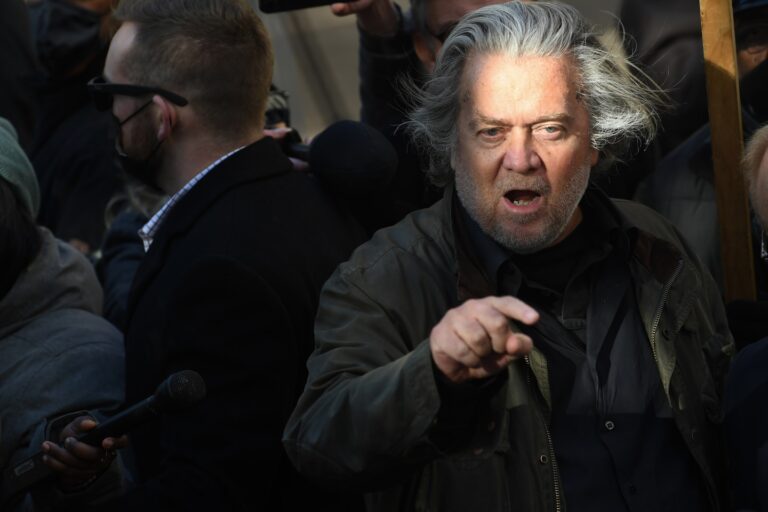The Supreme Court’s denial was a one-sentence order that read, “The application for release pending appeal, which was filed with the Chief Justice and referred to the Supreme Court, is denied.” The Supreme Court did not give reasons, but said the lower court had failed to raise a substantial legal question about Bannon, who was convicted on two counts of refusing to provide documents and testimony to House committees investigating the January 6, 2021, attack on the U.S. Capitol.
Bannon had asked the Supreme Court for an emergency stay on June 21 after a Washington, D.C., judge and the judge on the appeals court for his conviction rejected similar requests. Both courts said Bannon had little chance of succeeding in arguing that he relied on the advice of his lawyers and did not “willfully” break the law by ignoring the congressional subpoena.
“I am confident the conviction will be overturned and it is unfortunate that he was treated so unjustly. He should never spend a day in prison,” David I. Schon, the lawyer who represented Bannon throughout his trial and sentencing, said Friday.
Bannon’s lawyers argue that as a “chief adviser to the Trump campaign” he should have “the authority to participate in the campaign and comment on significant policy issues” as the 2024 election approaches.
Attorney General Elizabeth B. Preloger wrote that Bannon did not fall under the law’s “extraordinary” exception, arguing that the Supreme Court “cannot make the rigorous showing necessary to override the ordinary requirement that a convicted defendant begin serving his sentence.”
The court’s rejection of Bannon comes after it also rejected a similar request for immunity from detention for Peter Navarro, 74, a trade adviser to President Trump. Navarro is the first person to be jailed for contempt of Congress since the Cold War and is due to finish his four-month sentence on July 17. Navarro was convicted of the same charges in September after writing in his memoir that he and Bannon plotted to block Joe Biden’s inauguration.
The men argued that they cannot testify before House committees investigating the Jan. 6, 2021, attack on the Capitol because they are subject to executive privilege, a constitutional separation of powers principle that protects the communications of a president’s top advisers from Congress.
But the judges ruled that unlike two other Trump aides whom the Justice Department chose not to prosecute for failing to appear before the committee – former White House chief of staff Mark Meadows and communications director Dan Scavino – Messrs. Bannon and Navarro did not receive a letter from the former president’s lawyers instructing them not to comply with subpoenas from the committee, specifically citing privilege.
On the contrary, Trump argued before the trial that executive privilege applied to Bannon, but Trump’s lawyers at the time told Bannon’s legal team the opposite.
“We do not believe your client will be granted immunity from testifying,” Trump’s White House lawyer wrote.
Bannon maintains a high political profile, advising Trump and others on his 2024 presidential campaign and appearing on his podcast, “War Room.” A former chief strategist for Trump’s 2016 election campaign, he served in the White House for a year and led a resurgence of the Trump movement after the Capitol storming.
Mr. Bannon faces other legal challenges. A New York judge last summer ordered him to pay about $500,000 in legal fees to lawyers representing him on multiple counts, including a criminal charge that he defrauded donors for a private effort to build a wall on the U.S.-Mexico border. Mr. Trump had pardoned Mr. Bannon in connection with those allegations.

